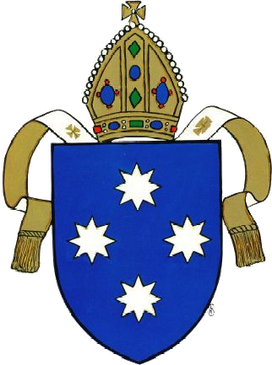
The Uniting Church in Australia (UCA) was founded on 22 June 1977, when most congregations of the Methodist Church of Australasia, about two-thirds of the Presbyterian Church of Australia and almost all the churches of the Congregational Union of Australia united under the Basis of Union. According to the church, it had 243,000 members in 2018. In the 2016 census, 870,183 Australians identified with the church, but that figure fell to 673,260 in the 2021 census. In the 2011 census, that figure was 1,065,796. The UCA is Australia's third-largest Christian denomination, behind the Catholic and the Anglican Churches. There are around 2,000 UCA congregations, and 2001 National Church Life Survey (NCLS) research indicated that average weekly attendance was about 10 per cent of census figures. The UCA is one of Australia's largest non-government providers of community and health services. Its service network consists of over 400 agencies, institutions, and parish missions, with its areas of service including aged care, hospitals, children, youth and family, disability, employment, emergency relief, drug and alcohol abuse, youth homelessness and suicide. Affiliated agencies include UCA's community and health-service provider network, affiliated schools, the Uniting Aboriginal and Islander Christian Congress, Frontier Services and UnitingWorld.

The Presbyterian Church in America (PCA) is the second-largest Presbyterian church body, behind the Presbyterian Church (USA), and the largest conservative Calvinist denomination in the United States. The PCA is Reformed in theology and presbyterian in government.

The World Assemblies of God Fellowship (WAGF) is a global cooperative body of over 170 Pentecostal denominations that was established on August 15, 1989. WAGF was created to provide structure so that member denominations, which previously related to each other informally, could more easily cooperate on a global basis.
The Confessing Movement is a largely lay-led theologically conservative Christian movement that opposes the influence of theological liberalism and theological progressivism currently within several mainline Protestant denominations and seeks to return those denominations to its view of orthodox doctrine or to form new denominations and disfellowship (excommunicate) them if the situation becomes untenable. Those who eventually deem dealing with theological liberalism and theological progressivism within their churches and denominations as not being tenable anymore would later join or start Confessional Churches and/or Evangelical Churches that continue with the traditions of their respective denominations and maintaining orthodox doctrine while being ecclesiastically separate from the Mainline Protestant denominations. Youth aligned with the Confessing Movement have viewed their project as being an 'Operation Reconquista'.

The Diocese of Sydney is a diocese in Sydney, within the Province of New South Wales of the Anglican Church of Australia. The majority of the diocese is evangelical and low church in tradition.

Moore Theological College, otherwise known simply as Moore College, is the theological training seminary of the Diocese of Sydney in the Anglican Church of Australia. The Anglican Archbishop of Sydney holds ex officio the presidency of the Moore Theological College Council.

The mainline Protestant churches are a group of Protestant denominations in the United States and Canada largely of the theologically liberal or theologically progressive persuasion that contrast in history and practice with the largely theologically conservative evangelical, fundamentalist, charismatic, confessional, Confessing Movement, historically Black church, and Global South Protestant denominations and congregations. Some make a distinction between "mainline" and "oldline", with the former referring only to denominational ties and the latter referring to church lineage, prestige and influence. However, this distinction has largely been lost to history and the terms are now nearly synonymous.
The Fellowship of Independent Evangelical Churches (FIEC) is a network of 638 independent evangelical churches in the United Kingdom. FIEC exists to help "Independent churches work together to reach Britain for Christ".

The Reformed Evangelical Anglican Church of South Africa (REACH-SA), known until 2013 as the Church of England in South Africa (CESA), is a Christian denomination in South Africa. It was constituted in 1938 as a federation of churches. It appointed its first bishop in 1955. It is an Anglican church and it relates closely to the Sydney Diocese of the Anglican Church of Australia, to which it is similar in that it sees itself as a bastion of the Reformation and particularly of reformed doctrine.
Campus Bible Study was established in 1975 at the University of New South Wales by the then Anglican chaplain Phillip Jensen. CBS celebrated its 40th anniversary in 2015, and continues to officially operate out of UNSW's Anglican Chaplaincy. The current Anglican Chaplain is Carl Matthei.

Lutheranism is present on all inhabited continents with an estimated 80 million adherents, out of which 74.2 million are affiliated with the Lutheran World Federation. A major movement that first began the Reformation, it constitutes one of the largest Protestant branches claiming around 80 million out of 920 million Protestants. The Lutheran World Federation brings together the vast majority of Lutherans. Apart from it, there are also other organisations such as the International Lutheran Council and the Confessional Evangelical Lutheran Conference, as well as multiple independent Lutheran denominations.
The Convergence Movement, also known as the Ancient-Future Faith, whose foundation is primarily attributed to Robert E. Webber in 1985, is an ecumenical movement. Developed as an effort among evangelical, charismatic and Pentecostal, and liturgical Christians and denominations blending their forms of worship, the movement has been defined for its predominant use of the Anglican tradition's Book of Common Prayer; use from additional liturgical sources common to Lutheranism, Eastern Orthodoxy, and Catholicism have also been employed.

The Conservative Congregational Christian Conference is a Congregationalist denomination in the United States. It is the most conservative and oldest Congregationalist denomination in America following the dissolution of the Congregational Christian Churches. It is a member of the World Evangelical Congregational Fellowship and the National Association of Evangelicals.

The World Reformed Fellowship (WRF) is an ecumenical, Christian fellowship that advances partnerships among confessional Reformed churches around the world.
The Global Fellowship of Confessing Anglicans is a communion of conservative Anglican churches that formed in 2008 in response to ongoing theological disputes in the worldwide Anglican Communion. Conservative Anglicans met in 2008 at the Global Anglican Future Conference, creating the Jerusalem Declaration and establishing the Fellowship of Confessing Anglicans (FCA), which was rebranded as GAFCON in 2017.
The Good Book Company (TGBC) is an evangelical Christian publisher, located in Epsom, Surrey, England. They are structured as a large unquoted, private company, limited by share capital. Their practices include publishing, mission outreach and training. The Publisher was declared runner up in the Christian Publisher of the Year Award by the Trade Body for Christian Publishing and Retailing in the UK.
Evangelical Baptist Convention is a Baptist Christian denomination in Manipur, India. Their main area of presence is in the southern part of Manipur. It is affiliated with the Asia Pacific Baptist Federation. Its headquarters, Dorcas Hall, is located at Hebron Veng, New Lamka.
Alan Stewart is an Australian bishop. He is most well-known for having been the National Director of the Fellowship of Independent Evangelical Churches in Australia.
The Africa Evangelical Presbyterian Church (AEPC) is a growing conservative Presbyterian and Reformed Church which adheres to the Westminster Confession of Faith started in Kenya, later spread to the surrounding countries like Burundi, Tanzania, Congo and as far as Zimbabwe. The headquarters of the church is located in Nairobi, Kenya. The current Moderator is Rev. Dr Joseph Mutei installed on Sunday 26th June 2022.










